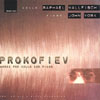Prokofiev Works for Cello
Another fine recording from the enterprising Black Box label, and a superb survey of Prokofiev's music for cello
View record and artist detailsRecord and Artist Details
Composer or Director: Sergey Prokofiev
Label: Black Box
Magazine Review Date: 4/2000
Media Format: CD or Download
Media Runtime: 65
Mastering:
DDD
Catalogue Number: BBM1027

Tracks:
| Composition | Artist Credit |
|---|---|
| Ballade |
Sergey Prokofiev, Composer
John York, Piano Raphael Wallfisch, Cello Sergey Prokofiev, Composer |
| (5) Songs without words |
Sergey Prokofiev, Composer
John York, Piano Raphael Wallfisch, Cello Sergey Prokofiev, Composer |
| Sonata for Cello and Piano |
Sergey Prokofiev, Composer
John York, Piano Raphael Wallfisch, Cello Sergey Prokofiev, Composer |
| Sonata for Cello |
Sergey Prokofiev, Composer
Raphael Wallfisch, Cello Sergey Prokofiev, Composer |
| (The) Tale of the Stone Flower, Movement: Waltz |
Sergey Prokofiev, Composer
John York, Piano Raphael Wallfisch, Cello Sergey Prokofiev, Composer |
| (The) Love for Three Oranges, Movement: Marche |
Sergey Prokofiev, Composer
John York, Piano Raphael Wallfisch, Cello Sergey Prokofiev, Composer |
| (10) Pieces from Cinderella, Movement: No. 10, Adagio (Pas de deux) |
Sergey Prokofiev, Composer
John York, Piano Raphael Wallfisch, Cello Sergey Prokofiev, Composer |
Author: Michael Stewart
This is the second disc from the new Black Box label to come my way. The first, an enterprising issue of music by the Irish composer Frank Corcoran (3/00), was a thoroughly commendable release in all respects, and the same high standards and quality performances are found here, in this issue of Prokofiev's complete works for solo cello.
The Ballade, Op 15 started life in 1902 as an unpublished violin sonata, but was reworked some 10 years later into this free-form sonata-rondo. Raphael Wallfisch's reading is gripping and suitably heroic and dark-hued in stature. It's a shame that the Cinq melodies, Op 35 rarely receive performances as originally intended, for wordless voice, but we do get to hear them now and again in Prokofiev's adaptation for violin and piano. Wallfisch's own adaptations of these haunting pieces are perhaps an even more preferable alternative, as he coaxes some beautifully full-throated and lyrical readings from the instrument.
There is certainly no shortage of fine recordings of Prokofiev's Cello Sonata in the current catalogue, but Wallfisch's distinguished and superbly characterised account can certainly stand with the best. As far as I know, however, no other recordings exist of the only surviving movement of the Solo Cello Sonata dating from the last year of Prokofiev's life. The single movement, completed from surviving material by Vladimir Blok, gives us a fascinating and tantalising glimpse into what might have been.
The disc is neatly rounded-off with three pieces from Prokofiev's stage works: two in arrangements by Piatigorsky and one, the March from The Love for Three Oranges, by Prokofiev himself. If you are looking for a comprehensive survey of Prokofiev's music for solo cello, look no further.'
The Ballade, Op 15 started life in 1902 as an unpublished violin sonata, but was reworked some 10 years later into this free-form sonata-rondo. Raphael Wallfisch's reading is gripping and suitably heroic and dark-hued in stature. It's a shame that the Cinq melodies, Op 35 rarely receive performances as originally intended, for wordless voice, but we do get to hear them now and again in Prokofiev's adaptation for violin and piano. Wallfisch's own adaptations of these haunting pieces are perhaps an even more preferable alternative, as he coaxes some beautifully full-throated and lyrical readings from the instrument.
There is certainly no shortage of fine recordings of Prokofiev's Cello Sonata in the current catalogue, but Wallfisch's distinguished and superbly characterised account can certainly stand with the best. As far as I know, however, no other recordings exist of the only surviving movement of the Solo Cello Sonata dating from the last year of Prokofiev's life. The single movement, completed from surviving material by Vladimir Blok, gives us a fascinating and tantalising glimpse into what might have been.
The disc is neatly rounded-off with three pieces from Prokofiev's stage works: two in arrangements by Piatigorsky and one, the March from The Love for Three Oranges, by Prokofiev himself. If you are looking for a comprehensive survey of Prokofiev's music for solo cello, look no further.'
Discover the world's largest classical music catalogue with Presto Music.

Gramophone Digital Club
- Digital Edition
- Digital Archive
- Reviews Database
- Full website access
From £8.75 / month
Subscribe
Gramophone Full Club
- Print Edition
- Digital Edition
- Digital Archive
- Reviews Database
- Full website access
From £11.00 / month
Subscribe
If you are a library, university or other organisation that would be interested in an institutional subscription to Gramophone please click here for further information.




